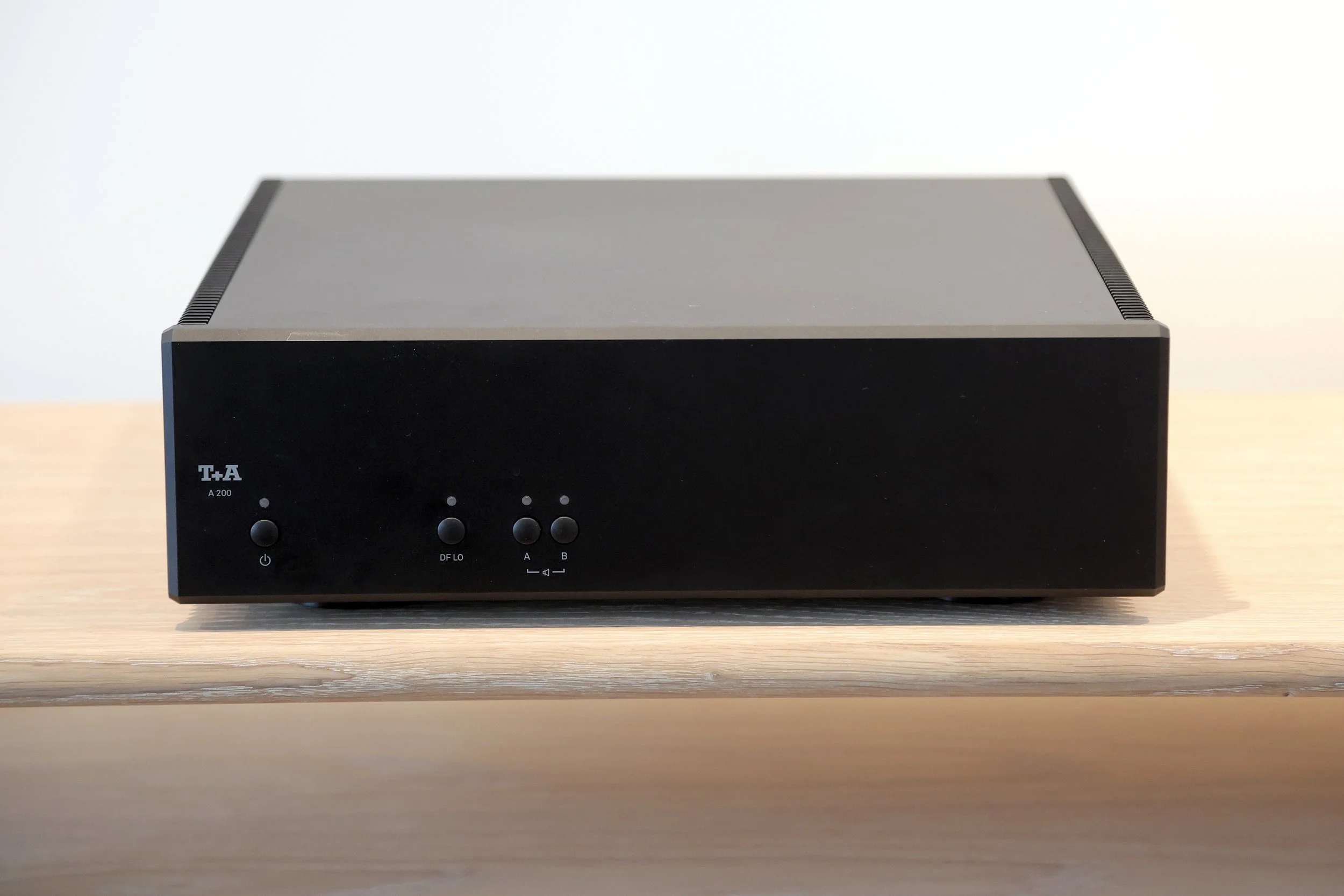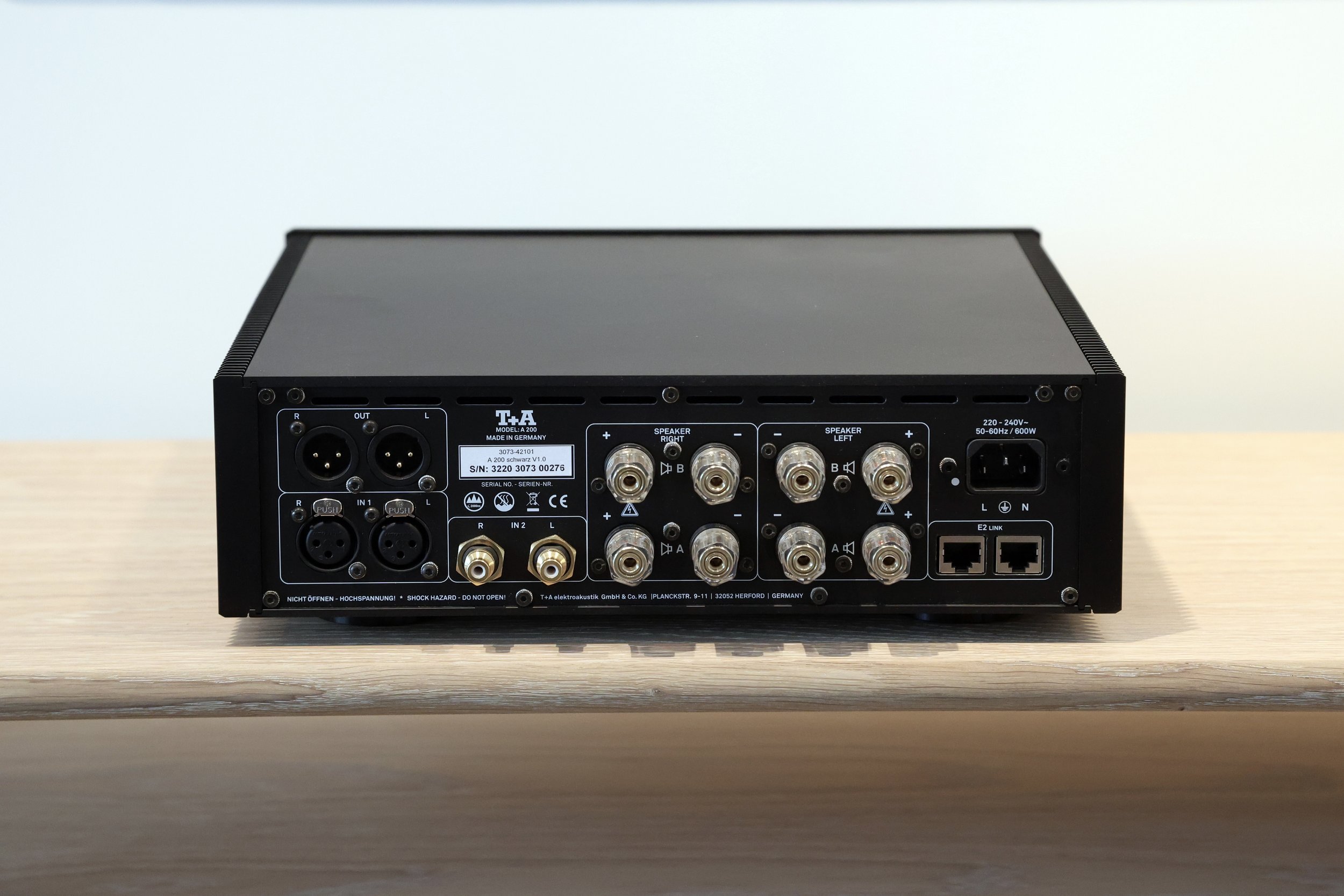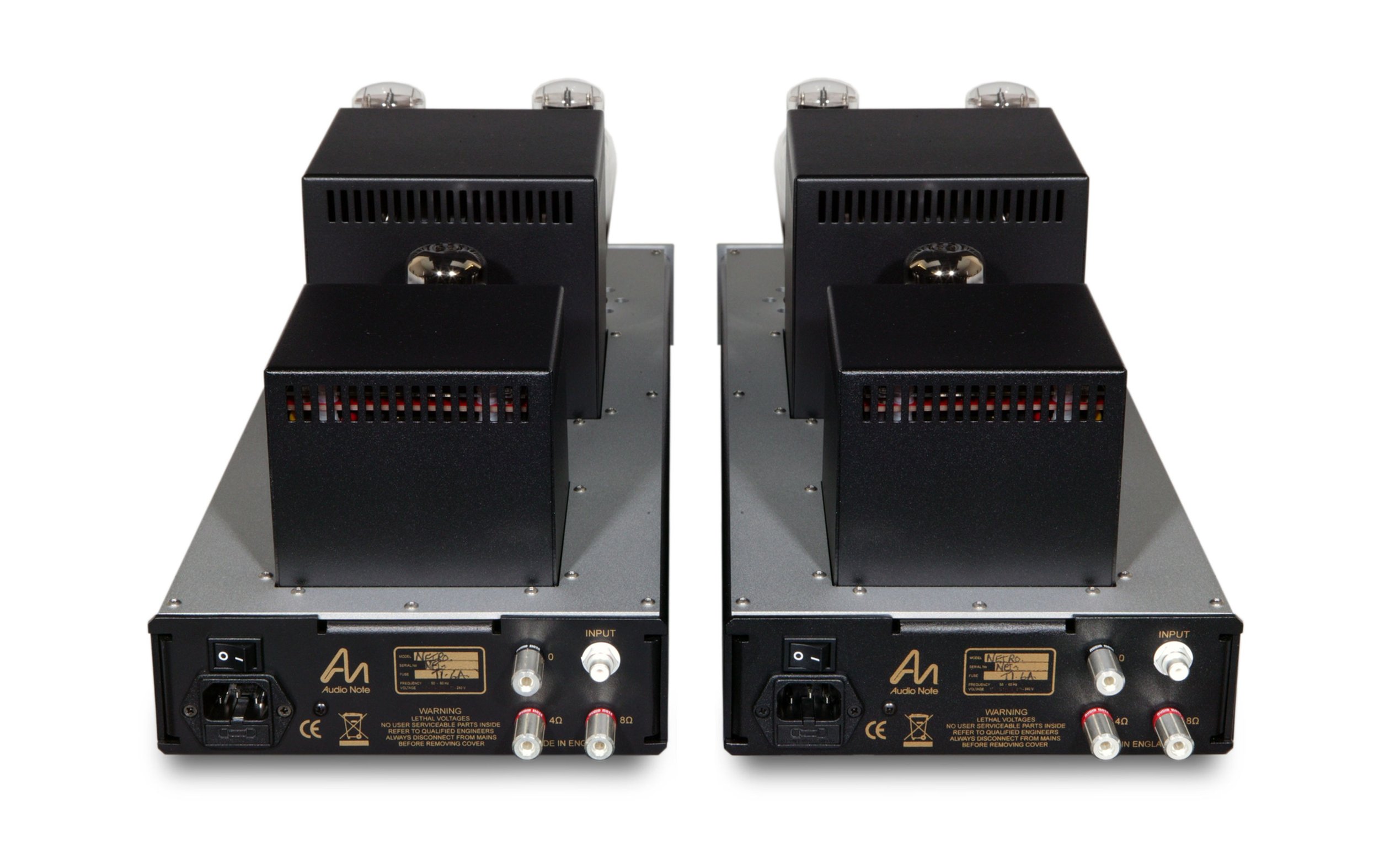T+A A 200 Power Amplifier
In designing the A 200 output stage it was our goal to combine maximum amplifier power with audiophile sound characteristics. On the one hand this means 250 Watts of continuous power per channel, and on the other hand this substantial power does not result in a reduction in terms of subtle detail, resolution and fine dynamics. Its heatsinks are both a technical necessity and a design statement: they show off every Watt of power in impressive style as well as ensuring efficient heat dispersion - even under maximum load. The A 200 output stage was developed with the aim of functioning either as a potent complement to an existing system, or as the high-performance end of a perfectly matched chain of specialised audiophile devices in combination with the Series 200.
In designing the A 200 output stage it was our goal to combine maximum amplifier power with audiophile sound characteristics. On the one hand this means 250 Watts of continuous power per channel, and on the other hand this substantial power does not result in a reduction in terms of subtle detail, resolution and fine dynamics. Its heatsinks are both a technical necessity and a design statement: they show off every Watt of power in impressive style as well as ensuring efficient heat dispersion - even under maximum load. The A 200 output stage was developed with the aim of functioning either as a potent complement to an existing system, or as the high-performance end of a perfectly matched chain of specialised audiophile devices in combination with the Series 200.
In designing the A 200 output stage it was our goal to combine maximum amplifier power with audiophile sound characteristics. On the one hand this means 250 Watts of continuous power per channel, and on the other hand this substantial power does not result in a reduction in terms of subtle detail, resolution and fine dynamics. Its heatsinks are both a technical necessity and a design statement: they show off every Watt of power in impressive style as well as ensuring efficient heat dispersion - even under maximum load. The A 200 output stage was developed with the aim of functioning either as a potent complement to an existing system, or as the high-performance end of a perfectly matched chain of specialised audiophile devices in combination with the Series 200.
We only believe in power when we can use it in practice with efficiency and precision. In our search to achieve the optimum blend of sound quality, power and efficiency, we have developed a completely new circuit topology which combines T+A’s unique HV and High-Frequency sine-wave mains power supply technology with that of the PURIFI Eigentakt™ output stages. By this means we have succeeded in converting raw power into unsurpassed audiophile performance. All circuits and circuit boards are designed and executed by our own development team, and the PURIFI modules implemented within them. The damping factor of the A 200 can be reduced if a warmer or softer sound image is desired in combination with particular loudspeakers.
Output Stage
The A 200 Class D output stages incorporate PURIFI Eigentakt™ technology. This platform, developed by the Danish technology company, is currently the world’s leading fundamental design for Class D output stages, as it eradicates the disadvantages of the previous generation of digital amplifiers. Until now digital amplifier designs were limited by their high dependence on the impedance of the loudspeakers connected to the system, by distortion in the output signal, by phase noise and increased distortion at high power levels. In contrast, the outstanding feature of this new circuit design is its outstanding measured data, making it the obvious choice for audiophile applications:
Extremely low distortion factor and intermodulation distortion at all power levels
Extraordinarily low noise
High damping factor
Clean clipping
Low losses, high efficiency
Totally linear frequency response up to 60 kHz
Completely loudspeaker-load independent characteristics (see measured curves into 4 Ohms and without loudspeaker-load)
Main Section
In spite of their advantage in terms of efficiency, conventional switching mains sections have an inherent drawback: they generate interference in the form of induced interference, which has a consistently adverse effect on sound quality. Our response to this is to employ our T+A High-Frequency sine-wave mains sections: their pure sine-wave output and higher frequency - more than twice as high as conventional mains sections - effectively eradicate this interference. The final trace of induced interference is eliminated by the intelligent recharging of the T+A reservoir capacitors fitted to the units. Over many years of development T+A engineers succeeded in developing capacitors which recharge 100,000 times per second - 2,000 times faster than conventional capacitors. This is necessary in order to ensure that they respond to extremely brief signal spikes, and are always able to deliver the correct quantity of electrical energy. Our sine-wave mains sections are “hard” units, i.e. they do not collapse even under the most severe load; they provide the output stages with absolutely constant voltage.
Intelligent Safe Control
Our Intelligent Safe Control (ISC) is comparable with the ABS of a sports car: the micro-controller uses numerous sensors to provide constant monitoring of the temperature, load or clipping states, and intervenes in an intelligent manner in order to return the parameters to their permissible range.
HV Circuit Topology
Our HV circuit technology is unique in the world, and is employed in the voltage amplifier stage. The high operating voltage resulting from the overall circuit design ensures extremely linear reproduction of the audio signals, and provides totally natural imaging and dynamics from every recording - without compromise, and without limitation. The technology also eliminates harsh feedback, to which audio sound is very sensitive.
Frequency Response
The frequency response is totally linear up to 60 kHz and completely independent of the connected loudspeaker. The measured curves show that there is no difference in frequency response between a 4 Ohms loudspeaker load and no loudspeaker load.
-
Output Stage
Nominal power per channel: 250 Watts @ 4 Ohms — 125 Watts @ 8 Ohms
Frequency response + 0 / − 3 dB: 1 Hz – 60 kHz
Signal to noise ratio: 113 dB
THD / Intermodulation: < 0,002 % / < 0,002 %
Channel separation: > 103 dB
Damping factor: > 800 / DF LO > 70
Gain factor: 37,4 (31,4 dB)
Input sensitivity nominal: High level (RCA) 800 mVeff / 5,8 kOhms — Balanced (XLR) 1,6 Veff / 20 kOhms
Mains / Accessories / Dimensions
Mains: 220 – 240 V, 50 – 60 Hz
Power consumption: max. 600 Watts — 25 Watts while power on and idling with no signal
Standby: < 0,5 Watts
Dimensions (H × W× D): 10 × 32 × 34 cm — 4 x 12.6 x 13.4 inch
Accessories: Power cord, E2-Link-cable
Weight: 5 kg, 11 lbs
Finishes: Alu silver anodized (43), Alu schwarz anodized (42)
Technical modifications reserved
-










































